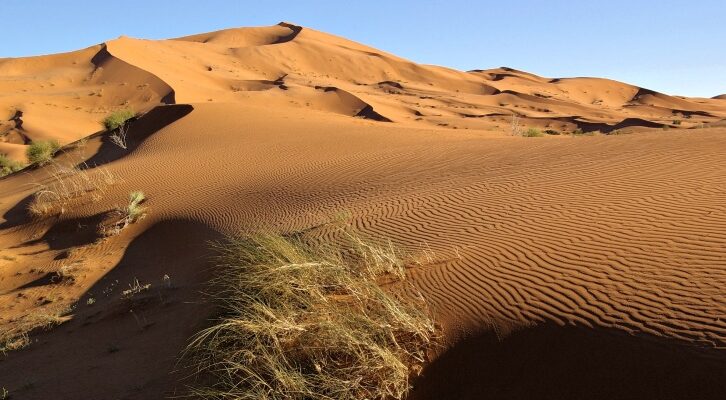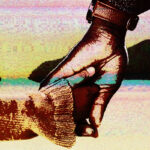Jake Skeets on the Diné Perspective of Time, Memory, and Land
This Week From the Emergence Magazine Podcast
Emergence Magazine is a quarterly online publication exploring the threads connecting ecology, culture, and spirituality. As we experience the desecration of our lands and waters, the extinguishing of species, and a loss of sacred connection to the Earth, we look to emerging stories. Each issue explores a theme through innovative digital media, as well as the written and spoken word. The Emergence Magazine podcast features exclusive interviews, narrated essays, stories, and more.
In this narrated essay, poet Jake Skeets enters into the memories he shares through touch and, in doing so, conjures a deep reverence for the spaces we remember. From a stubbled chin and stucco wall to bloody knees and tadpoles, the memories he shares are held in the physicality of the body. It is through what he calls “radical remembering,” which carries us across the time and space of existence, that he unfolds these “memory fields” through language and storytelling and offers this Diné perspective of time, memory, and land.
From the episode:
Memory is a touchy thing, and I mean that in the realest sense. The earliest memory I have is of my hand feeling the chin stubble of an older man. The room is evening-lit. My hand reaches out, and I graze the chin’s prickly skin. The older man smiles. I can’t see his entire face. I don’t recognize the house we are in, but it feels like a small home. I see the color red, but I don’t know what in the room is red. Maybe it’s the man’s jacket, made of a shiny fabric with a red band across the back and chest. I hear no sound, taste no thing, and I smell no distinct aroma. I can only feel the rugged chin and my hand gliding across it. Then, the smile of the man.
It won’t be until after returning home from college that I learn the older man is actually my maternal grandfather. I was in the car with my family, and my mother was telling me the same story she has told me a thousand times: When I was an infant, my maternal grandmother would tie me to my high chair and spoon feed me. She also used to tie me to her chest and walk to the sheep corral to care for the goats. This time, however, she told me a new story. She told me I used to reach out to my grandfather’s chin, wanting to feel his stubble. I told her then that I remember an instance of doing that: my hand and his chin stubble. My mother nearly broke into tears. My maternal grandparents passed when I was still very young; I should have no recollection of them. Somehow, I remember that one moment between me and my grandfather.
In another early memory, I always see in the third person. I see myself coming out of my aunt’s house. This moment tends to replay itself at random times. I can clearly make out the darkness of my eyes, my hair somehow a lighter brown than it is now, and my face scowling. I have a bowl cut, one of the many my father gave us when our hair grew too long during the summer. I stand there looking out toward my other aunt’s house. I have on a blue T-shirt, and I remember having just eaten, because I feel full. I have this moment stained inside me: I’m looking outward and mad for some reason. I know it’s late afternoon because the house casts a large shadow in the front yard that makes it cool enough to linger outside. I don’t know much else about this moment, or why it’s somehow repeated in the machinery of my mind. I also don’t know why I see myself in the third person. Who is the I looking back at my former self? Is it my present self? Or was it my past self that etched that moment into my memory? I have repeatedly dissected this moment, trying to identify any real reason as to why it exists. The only thing that stands out to me from this memory is how dark my eyes are in the shade and the rough feeling of my aunt’s house when I trace my finger along its outer wall.
________________________________
Listen to the rest of this story on Emergence Magazine’s website or by subscribing to the podcast.
Jake Skeets is Black Streak Wood, born for Water’s Edge. He is Diné from Vanderwagen, New Mexico. He is the author of the poetry collection Eyes Bottle Dark with a Mouthful of Flowers, winner of the National Poetry Series and the American Book Award. He holds an MFA in poetry from the Institute of American Indian Arts. He won the 2018 Discovery/Boston Review Poetry Contest and has been nominated for a Pushcart Prize. He is a member of Saad Bee Hózhǫ́: A Diné Writers’ Collective and currently teaches at Diné College in Tsaile, Arizona.
Bear Guerra is a photographer whose work explores the impacts of globalization, development, late-stage capitalism, and the contemporary human condition. His work has been published by Emergence Magazine, The New York Times, The Wall Street Journal, The Atlantic, Le Monde, the BBC, NPR, University of Texas Press, and has been exhibited widely. Bear is also the photo editor for High Country News, has been a finalist for a National Magazine Award in Photojournalism, and was a Ted Scripps Fellow in Environmental Journalism at the University of Colorado. Originally from San Antonio, TX, Bear now lives in Tucson, AZ, with his wife and daughter.




















